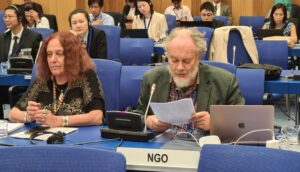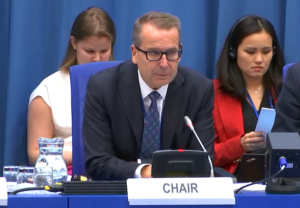By Aaron Tovish, Steering Committee Member, NoFirstUse Global
States Parties to the Treaty on the Prohibition of Nuclear Weapons (TPNW), meeting in New York from 27 November to 1 December 2023, adopted a declaration Our commitment to upholding the prohibition of nuclear weapons and averting their catastrophic consequences in which, amongst other things, they applauded “the growing explicit recognition that the use or threat of use of nuclear weapons is inadmissible” and noted “that these declarations, such as that agreed by members of the G-20, must go beyond statements and result in meaningful and tangible actions.” (Paragraph 16.)
This is a most promising and necessary development in a time of increased tensions, conflicts and nuclear sabre-rattling.
Since the G20 in November last year surprisingly acknowledged the ‘inadmissibility of the threat or use of nuclear weapons’, NoFirstUse Global has been trying to get universal affirmation and implementation of this stance, without much success — until now.
“The importance of the G20 Bali statement is that it strengthens a customary norm against the threat or use of nuclear weapons which is applicable universally, regardless of whether or not a State is party to the TPNW, NPT or other nuclear non-proliferation and disarmament treaty. But the G20 statement needs to be consolidated and implemented. This is why NoFirstUse Global launched Nuclear Taboo from Norm to Law following the G20 Summit, and why we highly commend the States Parties to the TPNW for following up on this.” Alyn Ware, International Representative for Aotearoa Lawyers for Peace. Member of the NoFirstUse Global Steering Committee
TPNW, UN General Assembly and the G20 Summit
The Second Meeting of States Party (2MSP) to the TPNW was held on the heels of the 78th Session of the First Committee (1stComm) of the United Nation General Assembly (UNGA). With the above cited paragraph, the 2MSP corrected, with dispatch, a glaring omission in the 1stComm; and thereby renewed hope for progress toward a nuclear weapons free world (NWFW).
The saga begins in Bali, Java, November 2022, with the gathering of the leaders of the Group of 20 (G20) leaders. For the first time in its nearly two-decade history, the G20 dealt, in two paragraphs, with international security issues; the impact that war on Ukraine was having on the economic and social issues they normally address made this unavoidable. The first of the two paragraphs took note of the condemnation of the Russian invasion by the UNGA, but acknowledged that not all the G20 were in agreement on this score. The second paragraph first summarized the principles that ought to guide the maintenance and restoration of international peace, including of course the Charter of the United Nations.
Then came the surprise: “The use or threat of use of nuclear weapons is inadmissible.” This was signed onto by all of the six nuclear-armed states in the G20, and goes well beyond the nuclear use doctrines of four of them — as well as the policy of NATO to which four other G20 subscribe, likewise, Japan and South Korea. (See Breakthrough at the G20 Summit: Leaders of nuclear weapon and allied states affirm the inadmissibility of nuclear weapons threat or use.)
Prior to the 2023 summit of the G20 in Delhi, it was unclear whether this stance would be nixed by several of the defense establishments of these countries. But, again a pleasant surprise, it was repeated, verbatim, in the Delhi Declaration in September, just prior to the 78th UNGA.
The next surprise was not so pleasant. None of the G20 countries chose to draw the attention of the 1stComm to the Bali-Delhi inadmissibility stance; not in their oral interventions nor in official documents and resolutions. Non-G20 countries did not step in to correct this oversight. (Delegates could not claim ignorance of this stance, since NoFirstUse Global brought it to their attention repeatedly.)
While the 1stComm was dropping the ball, new momentum was developing in the TPNW world. Shortly before the opening of the 2MSP, Indonesia submitted its ratification of the TPNW to the UN Secretary General. Recall that it was Indonesia which hosted the Bali G20 Summit, and wrote the first draft of its declaration.
So it is very good to see that the Statement of the 2MSP included paragraph 16, to quote in full:
“We applaud the growing explicit recognition that the use or threat of use of nuclear weapons is inadmissible. However, these declarations, such as that agreed by members of the G-20, must go beyond statements and result in meaningful and tangible actions.”
This, of course, is fully in line with paragraph 4 in the 1MSP statement of 2022:
“We are alarmed and dismayed by threats to use nuclear weapons and increasingly strident nuclear rhetoric. We stress that any use or threat of use of nuclear weapons is a violation of international law, including the Charter of the United Nations. We condemn unequivocally any and all nuclear threats, whether they be explicit or implicit and irrespective of the circumstances. “
But it goes further in that it challenges the nuclear-armed states to “go beyond statements”. This will be an important point for future MSPs to monitor progress on. It can become a “half-way house”* as the nuclear-armed states edge toward full adherence with the TPNW (or a comparable instrument or set of measures). In a strictly logical sense, nations that wish to retain the option of using nuclear weapons and to “benefit” from the threat to do so, are simply not ready to relinquish their nuclear arsenals. This is especially true for first-use options, including escalation to nuclear warfare.
There is another way in which this TPNW endorsement of inadmissibility is also encouraging.
When the 1stComm voted on the resolution regarding negotiation of a multilateral non-use agreement, the ten non-nuclear, non-aligned countries who opposed or abstained were all TPNW signatories! Apparently, some felt that the TPNW already covers non-use and so a separate treaty to that effect would be counterproductive. Were there even a single nuclear-armed state actively engaging with the TNPW, creating a less demanding alternative might have a negative effect. Unfortunately, there is none at this juncture and anything that draws the nuclear armed states toward a NWFW should be treated as positive.
Paragraph 16 shows a clear awareness of this dynamic on the part of all the TPNW States Party and is, thus, welcomed. The number of states that are now on record as proponents of inadmissibility is: 86, representing over two-thirds of humanity – (compared to the TPNW itself which includes only 1/3 of the world’s population and none of the nuclear armed or allied states).
As for the paragraph 16 challenge to the nuclear armed states, it can be addressed through confidence-building measures, be they unilateral, reciprocal, or multilateral, as well as a non-use agreement, such as the non-use of chemical weapons that was agreed upon after WWI and played a key role in preventing their use in WWII. The 1925 Geneva Protocols laid the foundations for both the Chemical and Biological Weapons Conventions, which has brought about the elimination of those weapons of mass destruction.
NPT Review Conference – 2nd Preparatory Committee
The next forum for advancing inadmissibility could be the 2nd Preparatory Committee (PrepComm) for the 11th Review Conference (RevCon) of the Non-Proliferation Treaty (NPT).
No-first-use policy was broached at the 1st PrepComm (see NPT States parties call for No-First-Use policies), but went down with the rest of the chairman’s draft report, when Russia rejected it for other reasons. If the war on Ukraine remains unresolved this coming May, of course, the same could happen again. But simply having countries openly championing inadmissibility (while none openly oppose it) would be a significant step forward in comparison to the deafening silence in the recent 1stComm!




